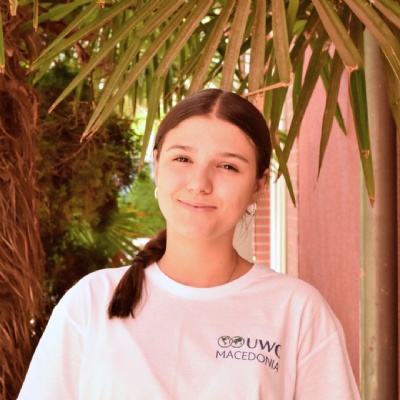
Leona Lozanovska
wants tо be versatile
A few of the Committee members chatted with our newly selected students before they begin their UWC journey. Take a look and get to know them 🙂
Filter

wants tо be versatile

wants tо be versatile
Мy interview dialogue with Leona ran effortlessly and naturally, mostly due to her spectrum of different interests.
Speaking of her versatility (I’d say it’s infinite), every time in our conversation I got to the point where I started to believe I knew Leona better and had enough information to compose her profile, at exactly that moment Leona would casually drop some new astonishing facts about her, like that she speaks seven languages, and she’s just starting to learn Italian!
This versatility and desire to try new things motivated her to apply for the new pilot program at UWC Atlantic known as ‘System Transformation Pathways’ (developed in part by a Macedonian Vice-Principal at UWC Atlantic!), which aims to equip students with the necessary skills to tackle some of the most complex global challenges confronting humanity in combination with social-human subjects such as global politics, economics, English language, and literature. As she explains, UWC is her chance to try something new, and Leona is eager to make the most of it!
She spent her high school days at Yahya Kemal College, where she was focused on studying the natural sciences of biology and chemistry and many unique extracurricular activities such as the Ancient Greek Club or Latino Dances.
Her love and proactivity in getting to know the new environment in which she would find herself in a few weeks were obvious. Even now, Leona knows what would like to try at UWC Atlantic: volunteering at a Conversation Hour in one of the refugee centers in Cardiff. She also knows exactly what she wants to avoid: surfing, swimming, and sailing in January in the freezing waters of the Atlantic Ocean.
Many of our candidates go to UWC to find themselves or figure out what they want to do. But Leona has already done a lot of that thinking, and walked me through her aspirations whilst growing up: “I have seen myself doing everything from being a cashier in Tinex to a businesswoman, astrophysicist, doctor, neurosurgeon, manager of a hotel chain.” Her current aspiration is a little different. Leona plans to continue studying business management and international relations upon graduating from UWC.
UWC isn’t this high school student’s first (and most certainly won’t be the last) international experience. Last year, she spent 3 weeks in Munich, Germany, at a summer camp. Previously, she visited the United Kingdom, where she participated in an international English language competition in London, from which she returned with several medals.
As her departure date is nearing, something she knows she’ll miss is celebrating the birthdays of each of her classmates with a birthday cake. Leona also got one at the end of this school year – as a farewell gift for leaving the class. I have to say a cold shower, along with the entire house gathered in your dorm at midnight—something everyone traditionally gets for their birthday at UWC Atlantic—will be a different experience for Leona. She will also miss her grandma’s sarma and the sunny weather at home. Although I had put in the effort to convince her that in Cardiff, Wales, she would easily recreate the sarma, I definitely couldn’t convince her she’ll recreate the sunny weather. Yet I am certain that her positive worldview will bring that sunshine even to the darkest corners of Wales.
Nela Chestojanova, July 2024
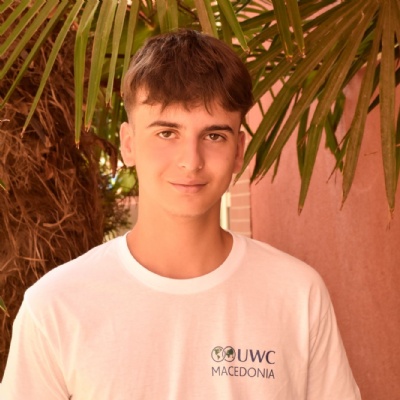
knows Skopje

knows Skopje
This summer, a few friends from abroad visited me in Skopje. To prepare, I started thinking about the story I wanted to tell them – the way I would frame how Skopje’s identity was formed. Skopje, throughout its history, has gone through many phases of building its own identity: as a result of the devastating earthquake in 1963, or the more recent project Skopje 2014, or even more recent attempts by a group of young people to build a beautiful city.
Andrej didn’t see himself as a person who will study far away. It made sense to me: he’s tied to Skopje (“I love my hometown!”) – to the history, the hangouts, and most of all, the opportunity to beautify it. If you walk through some of Skopje’s streets, it’s possible you’ll see the results of the artistic endeavors from Andrej and his friends.
The graffiti scene in Skopje is made up of a group of artists who relish the chance to create something everyone can see. Their goal is to break up the city’s monotony. Their tools are colors and a creative vision. And the result: fewer blank walls that convey no message.
Of course, not everybody is thrilled with this kind of vigilante-creativity (and I get it – we’re usually talking about public spaces!). But Andrej believes that this kind of visual art is consistent with the broader attempts, by all kinds of artists, to appreciate their hometown regardless of its flaws. The video Andrej sent us ahead of his final interview didn’t have a single narrative. Instead, it included short vignettes from Skopje’s streets, accompanied by the sound of Starogradska 2 (“Old town 2”) – a song by Skopje’s rap group Zad Agolot (Around the corner). The choice of a song wasn’t accidental: the whole point was to place what’s happening in the video (the graffiti, the hangouts) in the context of the musical and artistic history of the city.
On top of graffiti and music, Andrej is devoted to filmography. As early as elementary school, he showed interest in video-making, and this year he was given the opportunity to film a movie that showcases his high school. With a group of more than 10 people – a director, a scenographer, actors – Andrej created a short film. Its topic? The everyday problems of a newcomer in Skopje.
It’s hard when a candidate so integrated in his environment becomes part of UWC. It’s especially hard when the specific college is so far away – UWC Li Po Chun in Hong Kong. Andrej ranked it 15th (out of 18!) on his list because of the distance from Skopje. But he doesn’t want to miss the opportunities the college will provide: a serious education in visual arts, an opportunity to meet friends from across the world, and a chance to experience a new, much bigger city.
Skopje and Hong Kong are different cities, for sure. But Andrej has already contributed to building Skopje’s identity – now it’s time to try and leave a mark on Hong Kong as well.
Bobo Stankovikj, July 2024
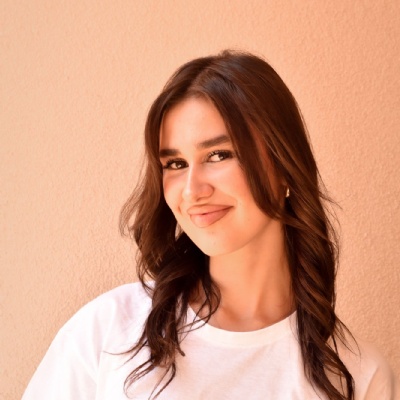
can handle anything

can handle anything
“I took care of him, and he took care of me.” That’s what life was like for Leontina and her grandpa, who she started living with at age ten. Growing up in Prilep, Leontina’s early childhood was marked by tragic destabilization: the loss of her parents. In an attempt to provide her a sense of familiarity, her grandpa moved from Skopje to Prilep so Leontina can finish middle school there. Afterwards, both of them move to Skopje, where Leontina enrolls in the vocational high school – in the economics track. When she has to say goodbye to her grandfather, too, Leontina becomes part of the SOS Children’s village – an institution that connects kids with foster families.
The UWC in Costa Rica has a long history of collaboration with SOS Children’s Villages across the world. Before joining the UWC movement, the school was known as Colegio Internacional SOS Hermann Gmeiner, named after the founder of SOS Children’s Villages. Gmeiner, an Austrian who had experienced the horrors of World War 2, believed every child needed a stable environment in which they can reach their potential. UWC Costa Rica, agreeing with Gmeiner’s vision and recognizing the resilience of kids from SOS Children’s Villages, allocates a limited number of scholarships to NCs who can identify and nominate successful candidates with an SOS background.
The fact that Leontina had to grow up too early results in three traits that are evident even in a short conversation.
The first: Leontina casually describes dealing with tasks virtually no one her age has to deal with. “I’ll have to head to Prilep – to wrap up some administrative things. You know when you go on vacation, but before you leave you clean up your house so it’s nice when you come back?” (In this case, vacation is two years of school in Costa Rica and cleaning up the house is dealing with a million documents in banks, registrars and public institutions because Leontina turned 18.)
The second: to deal with those tasks, Leontina knows how and where to ask for help. When she needed to communicate with the Ministry of Labor for remaining documents, Leontina wrote to the national Ombudsman’s office. They responded and helped her get in touch. When she needed documents for her UWC application, Leontina wrote to the administrators of the SOS Children’s Village, who helped her get a new passport.
The third: people around her want Leontina to succeed, and they invest their time accordingly. Her foster family jokes that if she ever needs anything in Costa Rica, “it’s not a problem – they’ll fire up the car and make their way.” Her mentors in the Human Resources internship work with her to explore potential careers in the field, which helped her develop a new interest and gain skills. National Committee members exchanged a ton of emails with the College before her nomination was accepted. Everyone who knows her is excited to see what she will achieve.
Leontina today has a ton of interests. She swims, she goes to singing classes, and she performs. She goes to the gym, she’s part of NGOs, and she participates in exchanges and workshops on social entrepreneurship. She’s tried modeling, and she has a 200+ day streak on Duolingo Spanish, so she’s ready when she arrives in Costa Rica. She’s collecting experiences.
“I miss him,” says Leontina, describing her grandpa who had a keen sense of humor even in his late 80s. “I go through old albums. But it was fate – and you can’t escape fate.”
Bobo Stankovikj, July 2024
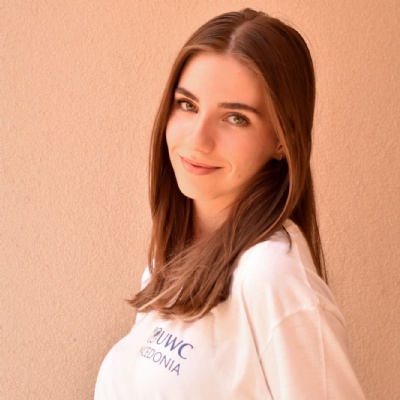
feels at home

feels at home
You may have heard the expression, “Once you take a bite of the Big Apple, aka New York City, your life will never be the same”
For Martina, this was accurate. Martina grew up in Radovish, a town that is … not exactly New York. Its 15,000 residents live nestled at the foot of Plachkovica mountain. Martina spent the first two years of high school at American High School in Skopje before embarking on the Youth Exchange and Study program in Wisconsin, in the United States. Initially, she intended to pursue a degree in computer science. But a trip to New York last November completely shifted her perspective, which motivated her to pursue film and cinematography as a major.
As Martina puts it so well, “The city inspires you to do something and to become someone.” Having visited NYC myself this winter, Martina and I spent an hour chatting about what makes this city so special, impressive, and remarkable.
Yet, it wasn’t just a trip to New York that changed how Martina saw her future; her enrollment in an introductory video production class during her first semester also played a crucial role. She did so well that her instructor encouraged her to switch to the advanced video class. Not surprisingly, Visual Arts will be one of the classes she will take in the International Baccalaureate program at UWC Changshu over the next two years. She plans to pursue an arts degree at NYU or cinematography in L.A. Only time will tell.
Martina is already familiar with the sense of adaptability and resilience needed to be far away from home on a different continent and in a different time zone. Living in a dormitory in Skopje, a few hours away from her home, definitely helped her deal with the homesickness at the beginning when she left for the USA. As she recalls, “I adjusted better than I originally thought I would.” She would return home to Radovish once or twice a month – which meant that, by the time she left for the exchange in the US, she was prepared to be away from home.
The exchange experience in the US among the diverse cohort she met from all over the world sparked her desire to apply to study abroad again, although this time instead of being 7 hours behind her home time zone, she will be 7 hours ahead.
Going away to study in China is just another leap forward. As she says, her family and friends, along with her cat, will miss her the most. However, she is delighted and looking forward to becoming acquainted with the new environment that will be her home for the next two years. One of her peers shared a 3D map of the college in China, and she is already in love with the picturesque, state-of-the-art campus in Changshu. On her bucket list for the upcoming two years is visiting world heritage landmarks like the Great Wall of China and the futuristic city of Shanghai.
All we can do is wish her two years of positive transformation and progress in her new environment and wait to see how China will shape her path in the future.
Nela Chestojanova, July 2024
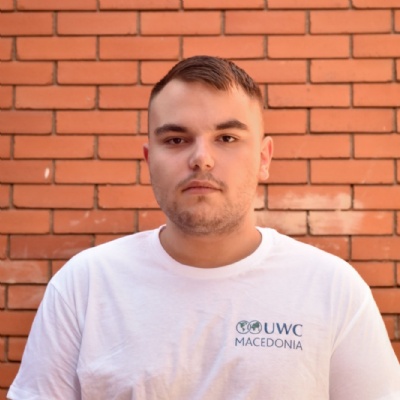
knows what he wants

knows what he wants
In our selection training, when we introduce new committee members to our grading criteria, we often tell them: “just because candidates are different from what you were like at age 16 doesn’t mean they aren’t good candidates!”
At age 16, I had no idea what I wanted to be. If someone asked me what I wanted to do in life, I usually said “talk”. If they really pushed, I’d say I wanted to be a lawyer (a career for people who talk). But I had no more detailed plan. This is why I found my conversation with Aleksandar so refreshing – because he (in accordance with our selection criteria!) could not be more different from me at his age.
Aleksandar knows that he wants to be a doctor. He’s known it for years. And he not only knows, but is actively working towards that goal. The interest was sparked by watching movies about doctors, then grew into a membership in the Red Cross and, later, admission into the medical high school. As part of the curriculum, Aleksandar spends time at the surgical department and helps medical personnel. He bandages wounds and helps with treatment. He attended a coronary artery bypass surgery.
Aleksandar recounts these experiences with utmost nonchalance – not because he doesn’t care, but because this isn’t news. It’s news to me, sure, but Aleksandar has known he’s wanted to be a doctor for a good while. So he’s made a plan. That plan first took him to medical high school and is now taking him to Norway, where his subjects will be (of course) biology, chemistry and psychology. After that, the plan has him going to university to study medicine, then going to specialization, then coming back to Shtip to be a surgeon – because he knows surgeons are needed.
I don’t want to leave you with an impression that Aleksandar isn’t flexible. On the contrary, he has a ton of interests – from listening to French canzones, to going to the gym, to marketing. He grew up in Shtip (“in the same apartment, on a street next to the park – a small place”), a child of parents working in the textile industry. He’s participated in Erasmus projects, debates, Red Cross actions… The kid is flexible with his friends, at hangouts, at coffee chats. Just not with his plans. Like he said: “if you’re flexible with your plans, you don’t know what you want.” And Aleksandar Angelovski knows what he wants – he just has to make it happen.
Bobo Stankovikj, July 2024
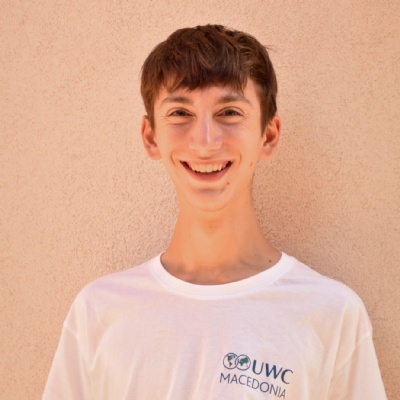
is honest with everyone

is honest with everyone
When Omar Sabuh came from Syria to Yugoslavia in 1969, his reason was simple: he wanted to graduate from the technological university. But fate had an additional plan: in the dorm he lived in, Omar met Lenka Ugrinovska – and fell in love, got married, you get the gist. But Omar returned to Syria, Lenka stayed in Skopje, and their descendants spread throughout the world. Partially because of it, Darin – Omar and Lenka’s 17 year old grandson – now has uncles and aunts across the world who generously offer couches and guest rooms to stay in.
This year, I wasn’t part of the selection process, which meant I didn’t get a chance to meet Darin before our conversation for this profile. In cases like those, the kids I talk to usually need some time to relax before we can dive into family histories and similar, deeper topics. But it seems to me that one of Darin’s main traits is honesty – so he didn’t need any warming up. He just started sharing.
He shared thoughts that weren’t always easy. When I asked him about his brother Teon (who turned 7 a few months ago), Darin openly reflected on his early feelings of neglect. Teon was born when Darin was in fifth grade – a turbulent period even without the addition of a new member of the family – and Darin recalled that he first thought “What is this kid doing here?” But that early jealousy very quickly turned into curiosity, and later into care, so Darin already knows that the goodbye with his little brother will be the hardest of all of them.
Darin wasn’t always so open about his feelings. In middle school, he didn’t fit in his class and mostly kept his thoughts to himself. He listened to music and wrote down what he felt to help him process. But at the suggestion of his dad, he went to a summer camp in eighth grade. “The food sucked and we were 15 kids to a room, but once I came back to Skopje i had a beautiful friend group that talked about everything.” So when he started at Orce Nikolov, Darin started talking – honestly and openly, even with folks he doesn’t know all that well.
These days Darin is getting ready to go to Norway. He works as a bartender and is starting to say goodbyes, including to his aunt and her dog, Zoe. He’s already in touch with some of the kids who will also go to Norway. (This year, at UWC Red Cross Nordic, we have two students and a professor!) He’s thinking about what’s next – he’s interested in Spain, but open to any options. And most of all, he’s talking: with Gurra and Marija, who already graduated; with Vasko and Ana and Andrej and Bogdan and all the other students from our national committee; with his parents, who are both worried and thrilled; and with Teon, who he’ll miss a ton.
Bobo Stankovikj, July 2024
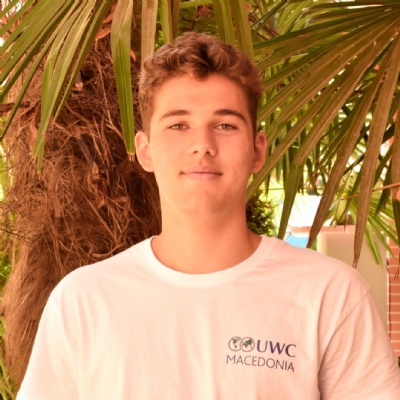
is constantly active

is constantly active
I will be honest: my call with Dimitar was scheduled for 9 in the morning, and I did not have enough sleep. I had woken up less than 3 minutes before the call and it took me a while to get into the rhythm of writing these profiles. But that was not an obstacle for a conversation with Dimitar. At times, when I tiredly tried to articulate what I wanted to ask him, he was quick to fill in the blanks and add his creative input to the conversation.
Dimitar is introspective. Whenever I asked him a question, in the selection process and during our last chat, he paused carefully for a few moments before answering. His answers are always thoughtful and reflect his calm thought process. In one of his interviews, he commented on the selection process and what it meant to him. During the selection process, he began to think about his habits compared to the values of the UWC movement and how to better adapt them – regardless of whether he receives an offer for one of them. He used this example to tell us about the changes he has started to make and how he wants to continue improving – he has started reading more, something that has been his goal for a long time, and he wants to continue improving in the field of mathematics. In addition, this year he tried to learn how to waltz, so in that spirit he will continue to try new things at UWC Thailand.
Dimitar enjoys traveling, and sharing and learning about cultures – he loves visiting new countries and learning about the communities and environments he enters. He believes that he learns best about new cultures when he is directly exposed to them – through interactions with locals, those who travel with him and by trying the local cuisine. These experiences have helped him to be open to faster adaptation throughout different conditions and challenges.
He does not like being passive – Dimitar is continuously active through sports and mental gymnastics. Usually when we think of sports, we think of physical fitness and activity. What Dimitar constantly emphasizes is that sport has not only helped him develop his competitiveness, but also serves him as a mental rest. Something that has marked his intersection of academic and personal interests is mathematics. Participation in competitions and Olympiads characterizes his competitiveness, parallel to his desire for continuous activity and improvement. As the cherry on top, when he was young he gave up piano lessons because he didn’t like it, but his desire to learn never faded. Dimitar renewed his love for music as a self-taught piano student.
Each part of his interests and characteristics skillfully complements and overlaps into a completely balanced personality – tirelessly active, constant brain tickling, and overall personal and social development. The three parts of UWC Thailand’s motto are reflected in Dimitar’s everyday life – Good Heart, Balanced Mind, Healthy Body.
Jana Kraleva, August 2024
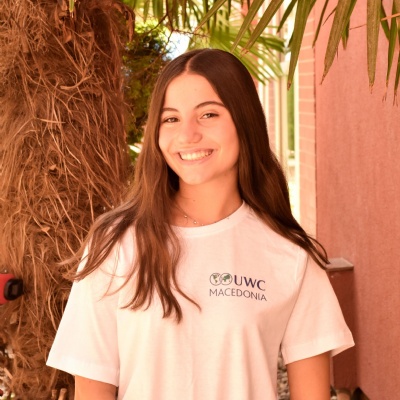
radiates positivity

radiates positivity
In the conversation with Ana, I confirmed to myself that it is always a loss if I don’t meet the new students in person. This is my first year not being able to attend the orientation camp, so I didn’t have a chance to chat without a screen separating us. “I’m very sorry that we haven’t talked to each other in person” – Ana said to me – she was a bit worried that I won’t experience her character well enough. However, it was easy to recognize the positivity that Ana carried with her throughout the process and during our conversation. She is an optimist – “I believe that there is good in everything and I always hope that things will be good, because there is no point in thinking about things going wrong”, said Ana, commenting on her outlook on life.
At one point, I gave her the opportunity to ask me a question that she would choose if we switched roles. Ana asked me what is most important for me in life, so I asked her that back. I wasn’t surprised by the answer, given that we were already talking about the importance of loved ones. It means the most to her when she spends time with her family and company. She says that she gets wisdom and knowledge from the people around her, and that you can learn a lot about a person from whom they choose to be close to. What else would you expect from someone as friendly and communicative as Ana?
A testament to her sociability are the places she likes to go out to – walks and ice cream in the City Park in spring and autumn, cafes where there is room for more people to be at the same table, and the frontyard of the elementary school where she grew up (an open place with a lot of space). Ana feels the best when she is in the presence of good company and positive people, so the places she chooses are spacious and allow more room for conversation.
But Ana also knows how to be critical, certainly as a constructive critic (again, looking on the positive side of things). The same school yard, she says, is in a very bad state and she understands why someone who doesn’t have a sentimental connection to the place wouldn’t want to sit there. People constantly break the benches and bins, so it annoys her when the locals don’t care about the environment, and that she is met with passivity when she wants to do something about it.
When it comes to UWC, Ana is excited about every part of the experience – from the International Baccalaureate, to the project weeks, CAS, and hangouts. She already knows that she will be taking biology and chemistry, because she has already been studying those subjects beyond her school’s curriculum. She has been participating in competitions for some time, and she won the third prize at the state biology competition – she modestly says “nothing huge, it can always be better” but she is proud that she does it with love and dedication.
This may have been my favorite sentence that Ana uttered, but when I asked her what she would pack and take with her, she said “I will take my smile with me, and the rest will come with time”. I can say that I am really sorry that we did not see each other, but the impression she left on me was more than enough to confirm that Ana really radiates positivity.
Jana Kraleva, August 2024
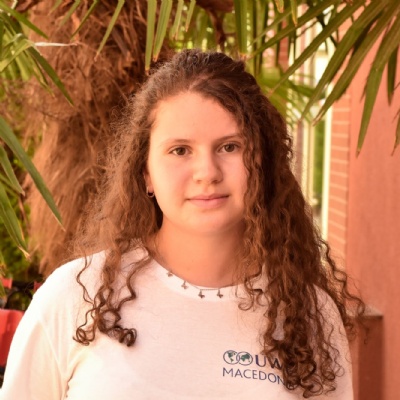
is a great adventurer

is a great adventurer
While talking to Iva I got the impression that I was talking to a world-class traveller, аs she speaks with so much passion and excitement about her travelling adventures around the world. All the amazing places that she had the opportunity to visit, she describes them so eloquently and vividly that you would get the feeling as if you travelled along with her to Southeast Asia last summer. Her stories, experiences and illustrations of these places, the people she met with, their customs and culture, she presents them so beautifully and uniquely that one would most likely start searching for flights to go on a quest and explore them.
Iva approaches the rigorous International Baccalaureate Diploma Program with ease. For this 16-year-old high school student, the world of the IB is familiar territory, as she has been part of it since kindergarten. She grew up and has spent most of her life in Georgia, where the official language is nothing similar to anything Slavic. At home, with her family, she spoke, in her words, a “funny mix” of Macedonian, Serbian, Russian and English. She is fluent in Georgian, too, which she had to learn in 6th grade, and a year from now hopefully she will add Chinese to her list, as she will be studying Chinese as a second language at the United World College (UWC) in Changshu China.
After graduating from high school in China Iva envisions herself continuing her education in the United States…perhaps Europe or maybe China, depending on the circumstances. She’s considering studying something in the field of Nuclear Energy or sustainability. As Iva beautifully puts it: “My creativity does not match any office job.”
Iva is thrilled and looking forward to starting her new educational adventure in China. Understandably, she also feels a bit sad and nostalgic about all the people and places she’s leaving behind her friends, family, and even her beloved teachers at her school in Georgia, who, as much as they were happy to see her moving on, were also sad that she’s leaving. It’s so far away on a different continent. Yet from every ending comes a new beginning. Her friends already have standing invitations to come and visit her in China. Since UWC Changshu has an allowance of 2 suitcases, Iva had already meticulously planned what she would put in each one. One is full of clothes and 10 jars of ajvar and the other is full of memorabilia which will remind her of home and make her feel close to her family and friends. We’re curious how many things she’ll bring back to remember her time there. Maybe she’ll collect so many memories that it’ll feel like she’s brought back a piece of China.
Nela Chestojanova, July 2024
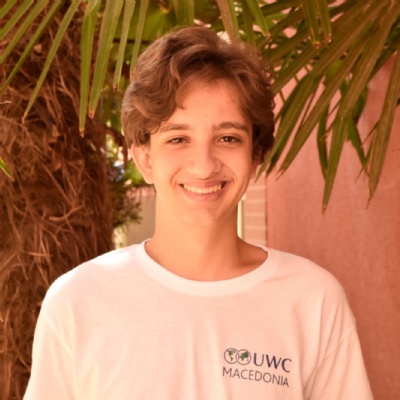
seizes the given opportunities

seizes the given opportunities
“A man who always takes advantage of his opportunities” – this is how Stefan describes himself. Applying to UWC is a basic example of how he manifests that description in his everyday life – he told me in one of the interviews “if you don’t select me now, I’ll apply again next year”. After everything I have learned about him, I will try to translate Stefan into a textual format, hoping that you will unequivocally agree with him and me.
Stefan wants to try everything – from an early age he tried training several sports such as karate, swimming, tennis, athletics, and even hip-hop dancing. However, his favorite sport is skiing… by himself. This is not something that is in character with Stefan if we look at the other activities he practices, but skiing gives him the chance to relax and enjoy his routes and on his terms. Even when he is not sure whether he will enjoy new experiences, it is very important for him not to have any regrets. This conversation was supported by an experience he had in Austria, where Stefan participated in a UWC short course. It’s probably one of his mother’s least favorite endeavors that Stefan has taken on – swimming in a glacier. He got a cold afterwards that passed quickly, which is much less important than the experience and friendships from that trip that he will remember forever.
Although it was not the main topic of conversation, music is very important to Stefan. From a young age, he attended music lessons in the music school Luj, where he started playing the piano and singing. “It’s not that I have such a developed taste in music” – said Stefan modestly – “but I really like to sing – I make smoothies in the kitchen and my folks at home have to listen to me.” After finishing nine years of music school, Stefan started playing the guitar. He likes classical music, but recently he started playing jazz. I think jazz fits well with Stefan’s character – I can imagine how much persistence it takes to learn jazz songs.
Something that left a strong impression on me is the energy and commitment he has. This can be seen in his everyday life, but also in small moments in conversation. Contrary to how he would describe himself, for me Stefan is a great conversationalist. When he answered questions throughout the selection process and in our informal conversations, he always found an original way to keep the conversation going, whether with interesting facts or recommendations – you could never be bored in his presence. Especially when he talks about something he is fond of or something he has put a lot of effort into, Stefan’s face lights up and he speaks with a smile. When we asked him about his video from the third round, he immediately began to tell us about his thought process – “I wanted to show that all the adventures and stories of the past make you who you are, so I got the idea with the CD as an already outdated concept, to talk about what has been so far and how I have developed into the current Stefan.” With every sentence he opens up space for people to want to ask him more about his experiences and to get to know him even better.
Stefan is a source of positivity and I am sure that he will fit in well in the environment of UWC Adriatic – there are many more opportunities for adventures ahead of him which he will undoubtedly seize.
Jana Kraleva, August 2024